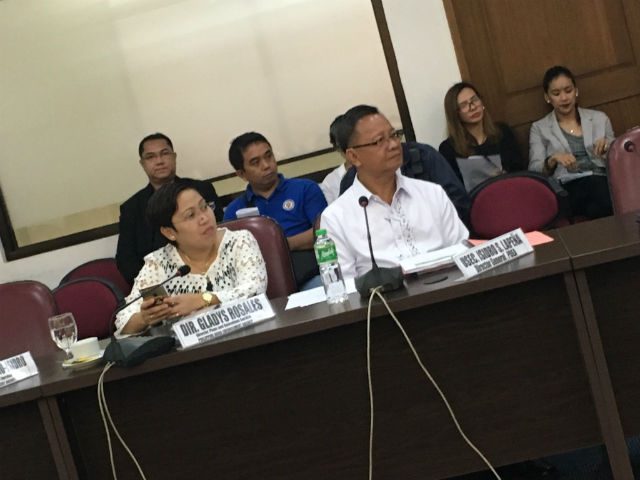SUMMARY
This is AI generated summarization, which may have errors. For context, always refer to the full article.

MANILA, Philippines – The Philippine Drug Enforcement Agency is urging Congress to pass a bill that would allow PDEA to examine the bank accounts and records of all drug suspects.
PDEA Director General Isidro Lapeña made the appeal during their briefing before the House Committee on Dangerous Drugs on Tuesday, August 30.
“This will help drug law enforcement agencies gather evidence against drug lords, financers, and coddlers,” said Lapeña. (READ: EXPLAINER: How serious is the PH drug problem? Here’s the data)
PDEA is the implementing arm of the Dangerous Drugs Board and is the “single-mission agency” leading all law enforcement agencies in the government’s campaign against illegal drugs. (READ: The dangers of the Dangerous Drugs Act Parts 1 and 2)
The Philippines has one of the strictest bank secrecy laws in the world. Republic Act (RA) Number 1405 or the Secrecy of Bank Deposits Act covers “all deposits of whatever nature with banks or banking institutions in the Philippines.”
Exceptions may be made, however, through a written permission of the depositor, cases of impeachment, or upon orders of a competent court in cases of bribery or dereliction of duty of public officials, or in cases where the money deposited or invested is the subject matter of the litigation.
The Anti-Money Laundering Council earlier sought to relax the country’s bank secrecy law to combat money laundering activities as well.
PDEA also supports the bills filed by several senators and congressmen seeking to amend RA Number 4200 or the Anti-Wire Tapping Law to allow law enforcement agencies to tap into conversations as part of their anti-illegal drug operations.
Currently, the law only allows authorized “peace officers” to wiretap conversations in cases involving crimes of treason, espionage, disloyalty during war, piracy, rebellion, conspiracy, sedition, and kidnapping, among others.
The following lawmakers want the exceptions to be expanded to include drug cases:
- Senator Juan Edgardo Angara
- Senator Panfilo Lacson
- Senator Grace Poe
- Deputy Speaker Ferdinand Hernandez
- Pangasinan 2nd District Representative Leopoldo Bataoil
- 1 PACMAN Representative Michael Romero
“I strongly believe this is one of the most important arms of drug enforcers against financiers, coddlers, protectors, and drug syndicates since drug lords do not carry drugs with them anymore. They just direct and facilitate the transaction. Wire-tappining will allow drug enforcement agencies to effectively and efficiently address the drug problem,” said Lapeña.
Meanwhile, PDEA is also urging lawmakers to amend Section 20 on asset forfeiture of Republic Act Number 9165 or the Comprehensive Dangerous Drugs Act of 2002.
“The money and properties forfeited from the accused shall be in favor of PDEA to be used in its operation expenses for its campaign against illegal drugs,” Lapeña said.
The PDEA exceeded its target in its anti-illegal drugs efforts in 2015, according to the Commission on Audit.
President Rodrigo Duterte’s war on drugs has also encouraged PDEA to intensify its campaign.
From June 30 to August 25, 2016, 330 joint operations of the PDEA led to the arrest of 498 drug personalities and 256 cases filed in court.
The arrested drug personalities include 219 high-value targets: foreign nationals, elected officials, law enforcers, government employees, drug and armed group members, drug den maintainers, and those in PDEA’s wanted and target lists.
PDEA is seeking a P1.217-billion budget for 2017, higher than this year’s P1.004 billion. – Rappler.com
Add a comment
How does this make you feel?
There are no comments yet. Add your comment to start the conversation.